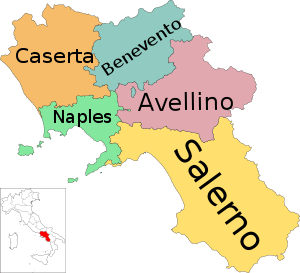Amalfi Coast
The Amalfi Coast (Italian: Costiera Amalfitana) is a stretch of coastline on the northern coast of the Salerno Gulf on the Tyrrhenian Sea, located in the Province of Salerno of southern Italy.
| UNESCO World Heritage Site | |
|---|---|
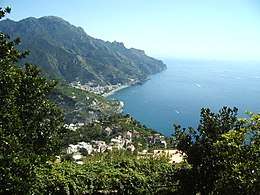 | |
| Official name | Costiera Amalfitana |
| Location | Campania, Italy |
| Criteria | Cultural: (ii), (iv), (v) |
| Reference | 830 |
| Inscription | 1997 (21st session) |
| Area | 11,231 ha (43.36 sq mi) |
| Website | www.amalficoastweb.com/index_italiano.html |
| Coordinates | 40°39′N 14°36′E |
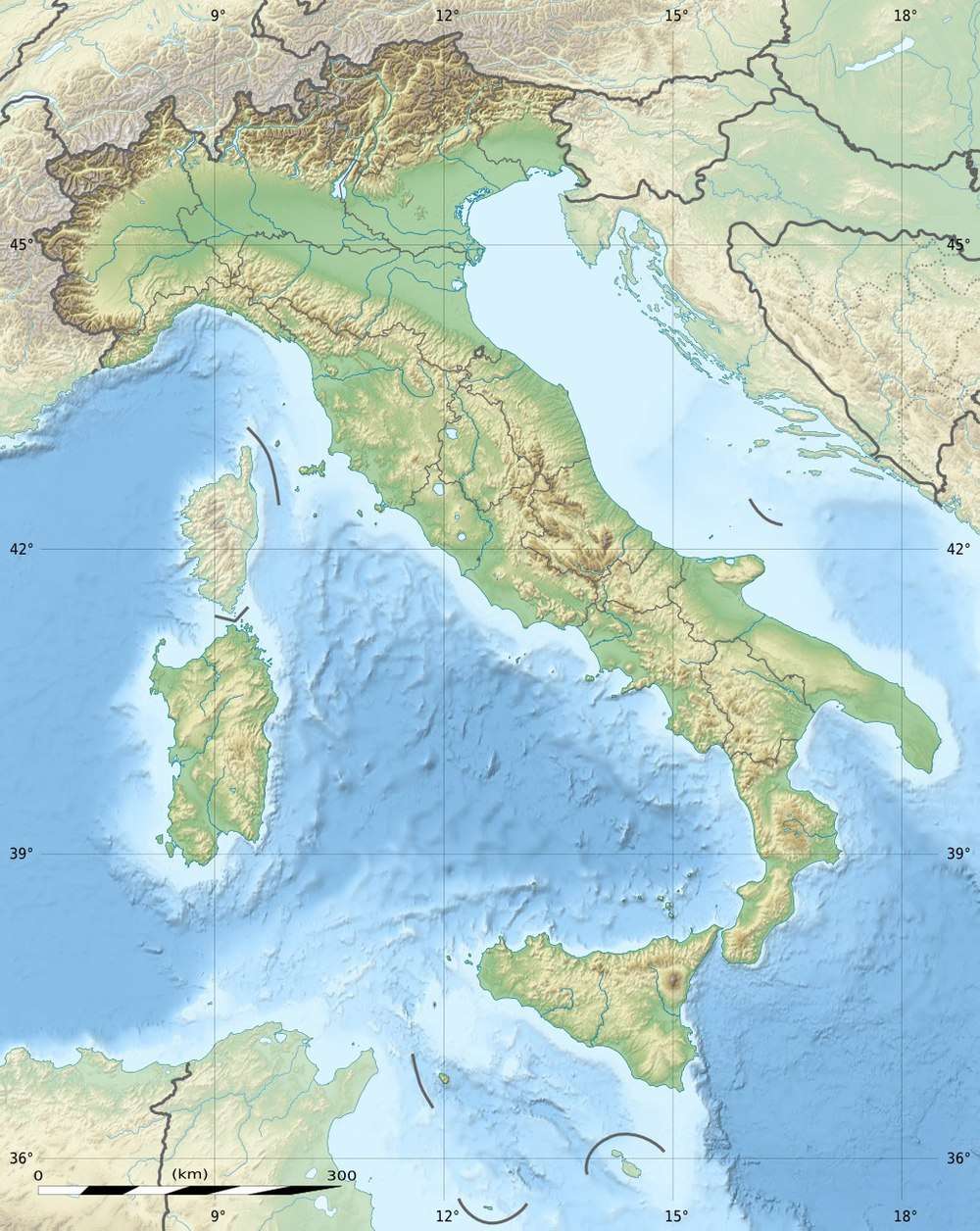 Location of Amalfi Coast in Italy | |
The Amalfi Coast is a popular tourist destination for the region and Italy as a whole, attracting thousands of tourists annually.[1] In 1997, the Amalfi Coast was listed as a UNESCO World Heritage Site.[2]
History
During the 10th–11th centuries, the Duchy of Amalfi existed on the territory of the Amalfi Coast, centered in the town of Amalfi. The Amalfi coast was later controlled by the Principality of Salerno, until Amalfi was sacked by the Republic of Pisa in 1137.[3]
Geography
Like the rest of the region, the Amalfi Coast lies in a Mediterranean climate, featuring warm summers and mild winters. It is located on the relatively steep southern shore of the Sorrentine Peninsula, leaving little room for rural and agricultural territories.[4] The coast comprises 11,231 hectares between the Gulf of Naples and the Gulf of Salerno.[5] The only land route to the Amalfi Coast is the 40 kilometres (25 mi) long Strada Statale 163 which runs along the coastline from the town of Vietri sul Mare in the east to Positano in the west. Thirteen municipalities are located on the Amalfi Coast, many of them centered on tourism.[6]
Municipalities
| Municipality | Frazioni | Attractions |
|---|---|---|
| Vietri sul Mare | Albori, Benincasa, Dragonea,[lower-alpha 1] Molina, Raito | Church of Saint John Baptist |
| Cetara | Fuenti | Tower of Cetara |
| Maiori | Erchie, Ponteprimario, San Pietro, Santa Maria delle Grazie, Vecite | Collegiata di Santa Maria, Castle of San Nicola de Thoro Plano, Santa Maria de Olearia |
| Tramonti | Campinola, Capitignano, Cesarano, Corsano, Figlino, Gete, Novella, Paterno Sant'Arcangelo, Paterno Sant'Elia, Pietre, Polvica,[lower-alpha 2] Ponte, Pucara | Conservatory of Pucara, Rupestrian Church in Gete |
| Minori | Montecita, Torre | Church of Santa Trofimena and the ancient Roman villa |
| Ravello | Casa Bianca, Castiglione, Marmorata, Sambuco, Torello | Villa Cimbrone, Villa Rufolo, San Giovanni del Toro, and the Duomo (Cathedral) |
| Scala | Campidoglio, Minuta, Pontone | Scala Cathedral |
| Atrani | none | Churches of San Salvatore del Birecto and Santa Maria Maddalena |
| Amalfi | Lone, Pastena, Pogerola, Tovere, Vettica Minore | Amalfi Cathedral, and its cloister (Italian: Chiostro del Paradiso) |
| Conca dei Marini | none | Main church of Saint John Baptist and the Emerald Grotto |
| Furore | Fiordo di Furore, Marina di Praia[lower-alpha 3] | Fjord of Furore |
| Praiano | Vettica Maggiore | Churches of San Luca and San Gennaro and Saint John Baptist |
| Positano | Montepertuso, Nocelle | Church of Santa Maria Assunta |
Economy
The Amalfi Coast is known for its production of limoncello liqueur as the area is a known cultivator of lemons, known as sfusato amalfitano in Italian, which are grown in terraced gardens along the entire coast between February and October.[7] Amalfi is also a known maker of a hand-made thick paper which is called bambagina.[8] Other renowned local products are a particular kind of anchovies (local Italian: alici) from Cetara, and the colorful handmade ceramics from Vietri.
Transport
There are buses and ferries along the Amalfi Coast.[9] There are also boat excursions from Positano and Amalfi.
Airport
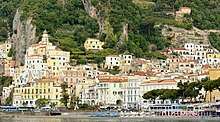
The nearest airport is the Salerno Costa d'Amalfi Airport. However, the most used airport to reach the area from abroad is Naples International Airport (Napoli-Capodichino).
In popular culture
.jpg)
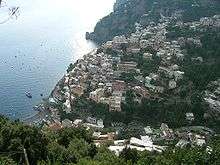
The rulers of Amalfi are the central figures in John Webster's Jacobean tragedy The Duchess of Malfi.
The Amalfi Coast is a popular destination among tourists. It was featured in Positano, a short story written by American author John Steinbeck in 1953.[10] It was also the setting in "Finding Positano, A Love Story" written by author William James in 2010.
The Amalfi Coast serves as a setting for fictional tracks in the Forza Motorsport 3,[11] Forza Motorsport 4 and Gran Turismo 4.
The city of Positano featured prominently in scenes of the film Under the Tuscan Sun.
Federico Fellini filmed some scenes of his movie Roma on the Amalfi Coast, and included shots of author Gore Vidal, who lived there at the time.
The Amalfi Coast was also used for the 2017 American superhero film Wonder Woman as the Amazon island of Themyscira.[12]
The Dutch artist M.C. Escher produced a number of art works of the Amalfi coast. [13]
Spike Milligan describes his time in Amalfi during a period of leave in the fourth part of his war memoirs, Mussolini: His Part in My Downfall[14]
See also
- Cilentan Coast, located on the Gulf of Salerno's southern shore
Notes
- Includes the localities of Iaconti and San Vincenzo.
- Polvica is the municipal seat of Tramonti.
- Partly included in the municipality of Praiano.
References
- "Bay of Naples & Amalfi Coast History". Unique Costiera. Archived from the original on 31 October 2011. Retrieved 28 June 2011.
- "Costiera Amalfitana". UNESCO World Heritage Centre. Retrieved 14 September 2015.
- Matthews, Jeff. "Naples". Around Naples Encyclopedia. University of Maryland University College. Archived from the original on 15 July 2011. Retrieved 14 September 2015.
- "Amalfi Geography". Authentic Italy. Archived from the original on 4 July 2008. Retrieved 14 September 2015.
- "The Amalfi Coast - UNESCO World Heritage Sites - Travel ideas". Italia.it. Retrieved 2018-03-30.
- "Amalfi People and Culture". Authentic Italy. Archived from the original on 5 August 2014. Retrieved 14 September 2015.
- "National cultivars". Limmi. Archived from the original on 21 July 2011. Retrieved 30 June 2011.
- "The Amalfi Coast Paper Museum". Retrieved 26 January 2012.
- "Amalfi coast bus & ferries: Timetables". Theamalficoast.net. Retrieved 14 September 2015.
- "Positano by John Steinbeck". FortuneCity. May 1953. Archived from the original on 8 June 2011. Retrieved 28 June 2011.
- "Forza 3's Ferrari Collection, Amalfi Coast Track Pictured". ShackNews. Retrieved 30 June 2011.
- "Here Are the Magical Places the Cast of Wonder Woman Stayed in Italy". cosmopolitan.com. 1 June 2017. Retrieved 19 March 2018.
- "Atrani, Coast of Amalfi". mcescher.com. 1931.
- see Penguin paperback edition, pp 220 and forwards
External links
| Wikimedia Commons has media related to Amalfi Coast. |
| Wikivoyage has a travel guide for Amalfi Coast. |
- Province of Salerno, Campania, Italy at Curlie
- Amalfi Coast at ENIT – Italian National Tourist Board

